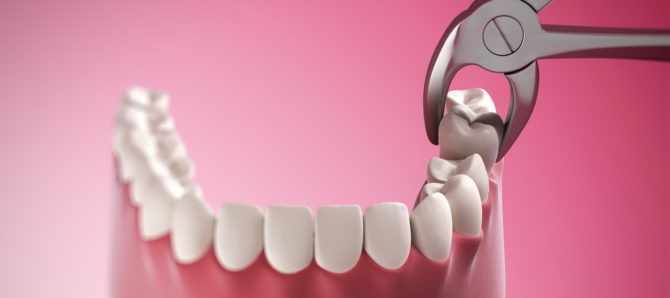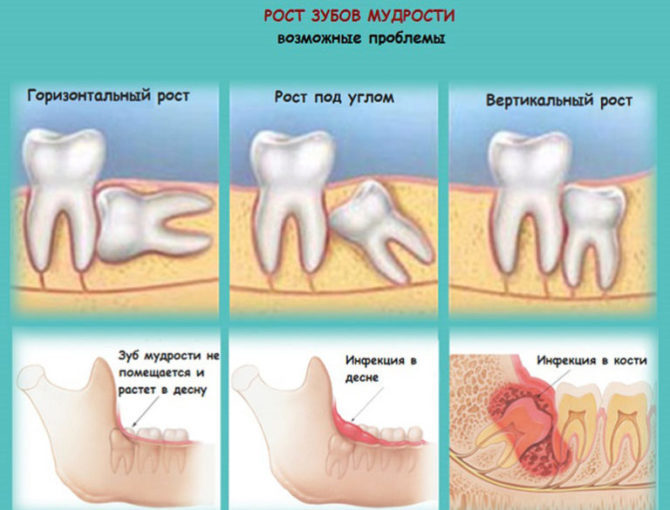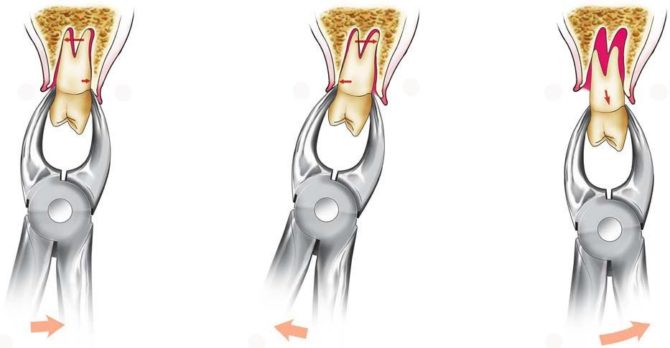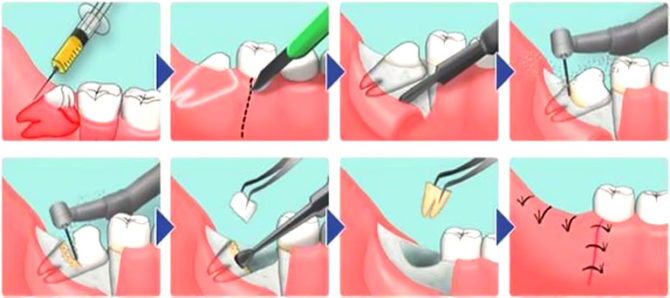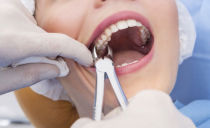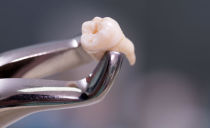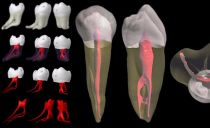Is it possible to remove teeth during pregnancy, how is the removal performed
Removing a wisdom tooth, molar, incisor or canine during pregnancy is even more noticeable stress than performing the same procedure at other times. The experiences of a woman in this period are associated not only with the fear of discomfort, but also with the likelihood of consequences for the baby. Therefore, many young mothers doubt whether it is worth exposing themselves and the child to such tests or is it better to wait until the baby is born.
Content
Can teeth be pulled out during pregnancy
To the question of whether it is possible to remove a tooth during pregnancy, no dentist can give a definite answer. The decision on the need for dental surgery is taken on an individual basis. At the moment when the doctor is preparing to pull out the tooth, the expectant mother has to experience not only excitement, but also the introduction of an anesthetic, which allows to anesthetize the tissues of the jaw. Therefore, if possible, the doctor tries to provide medical care without surgery.
But there are situations when tooth extraction is inevitable and cannot be delayed until the postpartum period:
- Intensive inflammatory process affecting the soft tissues and bones of the jaw, dental pulp.
- Constant pain that prevents a woman from sleeping and eating.
- The presence of sharp edges on a broken, chipped or dilapidated crown, injuring the tongue and the inside of the cheek.
- The presence of complications, including tumor neoplasms.
Removing Wisdom Teeth During Pregnancy
A wisdom tooth must be removed during pregnancy if it provokes severe inflammation during teething, has an abnormal position, or its crown is affected by caries. If you do not tear a tooth with such indications, it will constantly disturb the woman and can provoke serious diseases of the dentition and internal organs.
But since the removal of the third molar often represents a full-fledged surgical intervention, whenever possible they try to transfer it to the postpartum period.
Tooth extraction in the first trimester of pregnancy
In the early stages of fetal development, any interference with the body is unfavorable. The complexity of this period is that it is in the first weeks of fetal development that the beginnings of all the organs of the child appear and form, and dividing tissue cells are very vulnerable to stressful situations and drugs.
If a toothache occurs, a woman must consult a dentist. If a violent inflammatory process develops in the oral cavity, she needs urgent medical attention.
If there is a threat to the health of the mother and baby in the early stages of pregnancy, it is possible to remove even a wisdom tooth. But if you can wait, the doctor will not tear the tooth until the baby is born and will apply therapeutic methods for treating dental disease.
Tooth extraction for pregnant women in the second trimester
When the rudiments of the fetal organs are already formed, they become more resistant to adverse factors.Therefore, it is in the second trimester that dentists try to pull their teeth and conduct other complex dental procedures that cannot be postponed to the postpartum period.
Before removing the tooth to a pregnant woman, the doctor will make an anesthetic injection. There are pain medications that can be administered to women in position.
Tooth extraction in late pregnancy
After the “golden” second trimester, an alarming period sets in again, when there are more risks to the health of the baby and mother. In the last weeks of pregnancy, the excitement of a woman preparing for extraction may cause premature birth, therefore, at this time, trying to postpone tooth extraction to the postpartum period.
There are also practical "inconveniences" of tooth extraction in the last weeks of bearing a child: due to the large size of the abdomen, pregnant women find it difficult to sit for a long time, and some expectant mothers cannot lie on their backs, since the fetus presses on the large vessels of the abdominal cavity.
In the third trimester, as in the early stages of pregnancy, only those diseased teeth that can harm the woman and the fetus are removed. It is impossible to refuse such an operation, since serious dental diseases can affect both the state of the child’s body and the mother, and the course of childbirth.
Operation
After examining the patient’s oral cavity, the doctor decides whether or not to remove the tooth during a particular pregnancy. If the tooth still has to be pulled out, then the following measures are followed:
- X-ray examination. From the picture, the dentist studies the individual anatomical features of the diseased tooth in order to correctly remove it. It is advisable to visit such dentistry clinics that have modern, safer devices for acquiring jaw images.
- Anesthesia The doctor injects the patient with the drug for anesthesia, which is the least dangerous for pregnant women. Usually choose Ultracaine or Ubistesin, Novocaine in the form of a spray can be used before injection (it must be spat out). There are two basic requirements for anesthetics used to treat women in position: the drug should not penetrate the placenta and have a vasoconstrictor effect, which is fraught for the fetus with the development of oxygen starvation and a delay in metabolism.
- Carrying out tooth extraction. After the anesthetic introduced to the pregnant woman begins to act, the tooth can be removed. There are two types of tooth extraction - simple and complex. The diagrams below will help you familiarize yourself with the differences between the two procedures.
Within several hours after the tooth extraction, the action of anesthesia ends, the allocation of blood from the hole stops, and a blood clot forms in the place of the removed root, which resolves naturally.
Probable complications
With the correct operation of the tooth extraction and careful observance by the pregnant woman of the doctor's recommendations, the healing of the hole takes place the same way as in any other period of life. But sometimes there are complications:
| Complications | Possible reasons |
|---|---|
| Fainting | Increased susceptibility of women to such procedures, the influence of hormonal bursts accompanying pregnancy. |
| Injury to the jaw, maxillary sinus, adjacent teeth | Inaccurate actions of the dentist. |
| Severe bleeding, hematoma development | Injury to tissues during or after surgery, the action of hot food and warm compresses, the development of a purulent process in the hole, improper anesthesia. Common causes: the presence of systemic diseases, blood diseases and metabolic disorders. |
| Alveolitis - inflammation of the hole | Loss of a clot from the hole, infection by pulling the tooth, weak immunity, insufficient treatment of the hole with antiseptics, lack of oral care, smoking. |
| Jaw muscle contracture (muscle inflammation, jaw reduction) | Incorrect administration of anesthetic, the presence of infectious diseases. |
| Neuritis (violation of sensitivity in the upper or lower jaw) | Inaccurate actions by the dentist, difficult removal, inflammation of the hole after extraction. |
If complications develop after surgical dental treatment, you need to visit your dentist again to prevent the development of even more dangerous consequences.
How to tear out a tooth during pregnancy with the least risk, rules of conduct in the postoperative period
In order to protect yourself in advance from the negative consequences that may occur when a tooth is pulled out during pregnancy, you need to know some rules:
- Any question that concerns tooth extraction and causes excitement in the expectant mother should be immediately asked to the attending physician. This will help prevent mistakes and calm down.
- If a woman is very suspicious and very worried, before pulling out a tooth, the doctor will offer her to take a special sedative. Such funds should be prescribed by the gynecologist leading the pregnancy.
- Many women can easily tolerate complex tooth extraction if a husband, close relative or girlfriend is nearby.
- After tooth extraction, you must follow all the recommendations that the doctor gives.
A tampon placed in a well is removed after about 20 minutes. You can not rinse your mouth and try to clean the hole from a blood clot, so as not to violate the natural protection of tissues. In the first hours after a woman has her tooth pulled out, she should not eat, and during the first few days, she should eat hotter and chew on the operated side of the jaw.
- The dentist who will pull the tooth must be warned about the patient’s pregnancy and the current period.
- In case of swelling of the gums, ice wrapped in tissue can be used to reduce it.
- With severe pain, an anesthetic prescribed by a doctor is used. Taking medicine at your discretion, without consulting a gynecologist and dentist, is very dangerous for both the pregnant woman and the fetus.
It is better to deal with tooth problems before pregnancy, and any doctor will confirm this. With good nutrition, careful hygiene and regular preventive examinations by the dentist, the risk that a pregnant woman will have to pull out a tooth is significantly reduced. But if you still had to pull out a tooth while carrying the baby, you need to strictly follow the recommendations given by the dentist and gynecologist.

